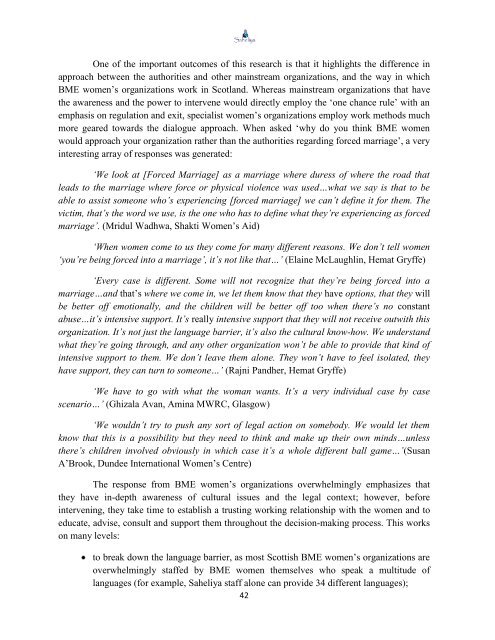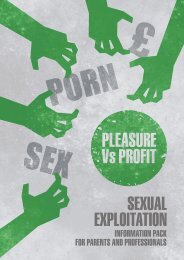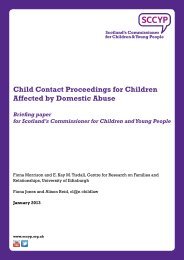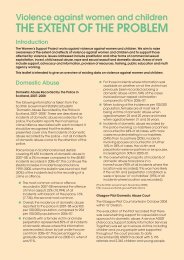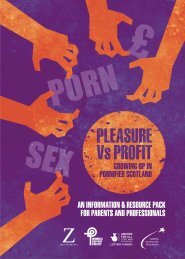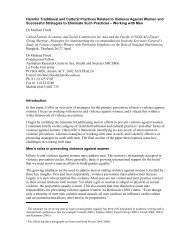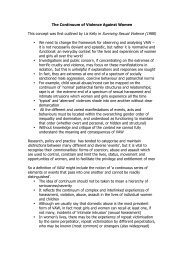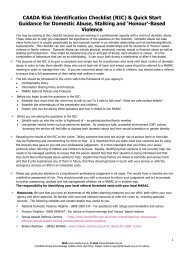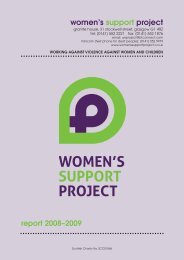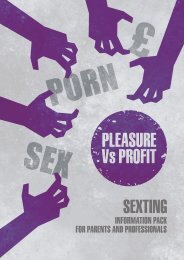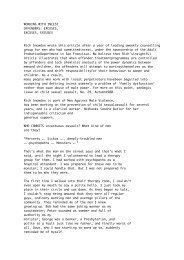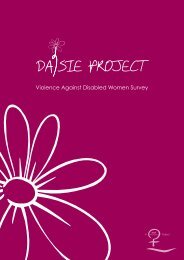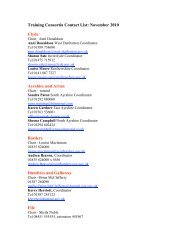WOMEN AND FORCED MARRIAGE IN SCOTLAND
women and forced marriage in scotland - Women's Support Project
women and forced marriage in scotland - Women's Support Project
- No tags were found...
You also want an ePaper? Increase the reach of your titles
YUMPU automatically turns print PDFs into web optimized ePapers that Google loves.
One of the important outcomes of this research is that it highlights the difference in<br />
approach between the authorities and other mainstream organizations, and the way in which<br />
BME women’s organizations work in Scotland. Whereas mainstream organizations that have<br />
the awareness and the power to intervene would directly employ the ‘one chance rule’ with an<br />
emphasis on regulation and exit, specialist women’s organizations employ work methods much<br />
more geared towards the dialogue approach. When asked ‘why do you think BME women<br />
would approach your organization rather than the authorities regarding forced marriage’, a very<br />
interesting array of responses was generated:<br />
‘We look at [Forced Marriage] as a marriage where duress of where the road that<br />
leads to the marriage where force or physical violence was used…what we say is that to be<br />
able to assist someone who’s experiencing [forced marriage] we can’t define it for them. The<br />
victim, that’s the word we use, is the one who has to define what they’re experiencing as forced<br />
marriage’. (Mridul Wadhwa, Shakti Women’s Aid)<br />
‘When women come to us they come for many different reasons. We don’t tell women<br />
‘you’re being forced into a marriage’, it’s not like that…’ (Elaine McLaughlin, Hemat Gryffe)<br />
‘Every case is different. Some will not recognize that they’re being forced into a<br />
marriage…and that’s where we come in, we let them know that they have options, that they will<br />
be better off emotionally, and the children will be better off too when there’s no constant<br />
abuse…it’s intensive support. It’s really intensive support that they will not receive outwith this<br />
organization. It’s not just the language barrier, it’s also the cultural know-how. We understand<br />
what they’re going through, and any other organization won’t be able to provide that kind of<br />
intensive support to them. We don’t leave them alone. They won’t have to feel isolated, they<br />
have support, they can turn to someone…’ (Rajni Pandher, Hemat Gryffe)<br />
‘We have to go with what the woman wants. It’s a very individual case by case<br />
scenario…’ (Ghizala Avan, Amina MWRC, Glasgow)<br />
‘We wouldn’t try to push any sort of legal action on somebody. We would let them<br />
know that this is a possibility but they need to think and make up their own minds…unless<br />
there’s children involved obviously in which case it’s a whole different ball game…’(Susan<br />
A’Brook, Dundee International Women’s Centre)<br />
The response from BME women’s organizations overwhelmingly emphasizes that<br />
they have in-depth awareness of cultural issues and the legal context; however, before<br />
intervening, they take time to establish a trusting working relationship with the women and to<br />
educate, advise, consult and support them throughout the decision-making process. This works<br />
on many levels:<br />
to break down the language barrier, as most Scottish BME women’s organizations are<br />
overwhelmingly staffed by BME women themselves who speak a multitude of<br />
languages (for example, Saheliya staff alone can provide 34 different languages);<br />
42


